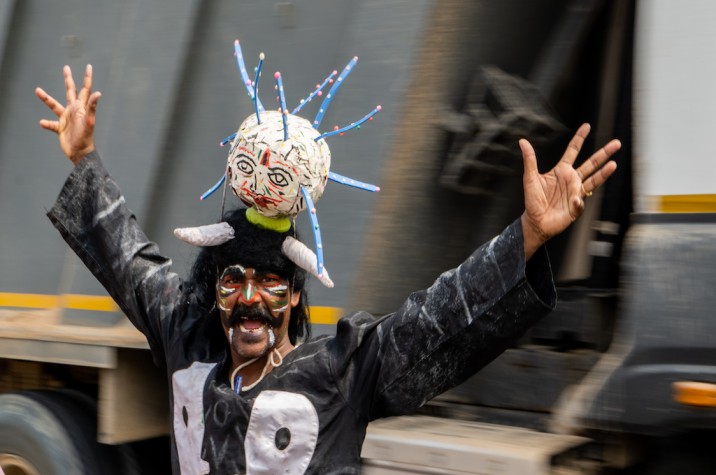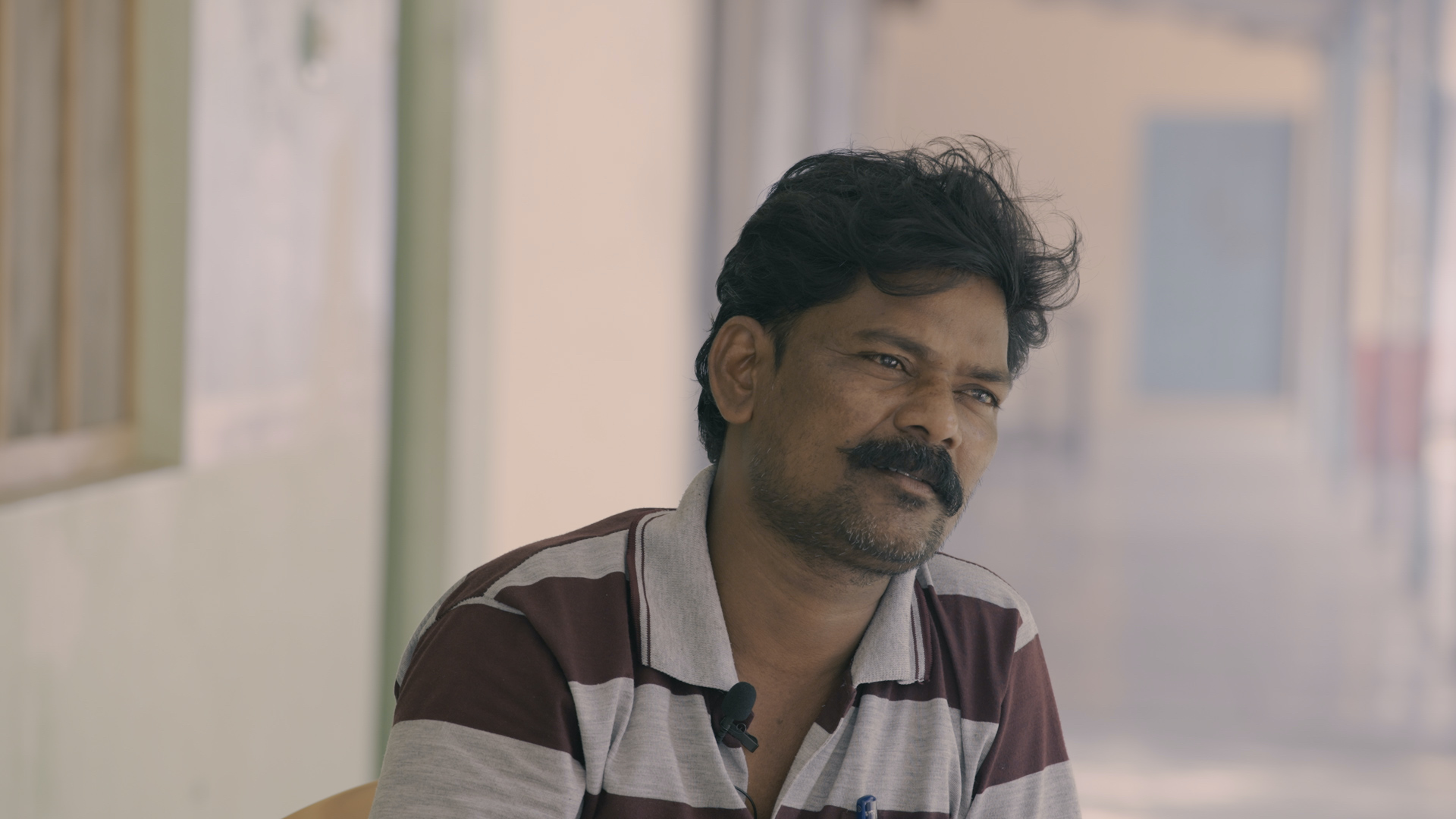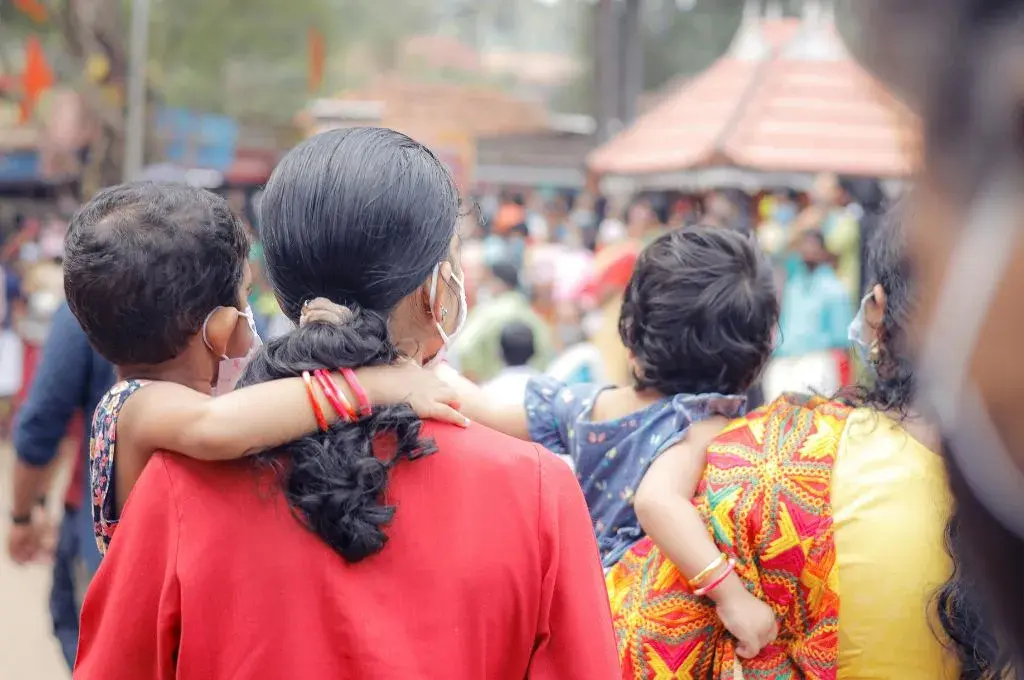I am Sree Ramulu, and I work as a cultural organiser at Rural Development Trust (RDT), a nonprofit based in Anantapur district in Andhra Pradesh. One of my responsibilities is to play the role of a ‘corona demon’, a character that we created to generate awareness about COVID-19. The corona demon is a visualisation of the COVID-19 virus and so, when I play this role, I dress up as scarily as possible. By doing so, I try to redirect the fear that people traditionally feel towards demons towards COVID-19. So, when people see this demon, we hope to instill some fear about the consequences of the coronavirus affecting their family and community.
Before working with RDT, I spent most of my time learning how to play dappu—a traditional drum that my father made for me. In addition to being interested in performing arts myself, RDT saw that I had the potential to be a youth community mobiliser and trained me in singing, dancing, and acting as well. I’ve worked as a cultural organiser since 2009 and I am based at the local centre in Bathalapalli, where I live with my wife and two sons.
During the first COVID-19 lockdown that started in March 2020, my team and I—three of us—brainstormed ways in which we could raise awareness among people about COVID-19 and encourage them to follow safety protocols. We noticed that most regular discussions and posters aimed at creating awareness about COVID-19 were not yielding promising results. We thought that since this is a virus that no one has seen before, it would help if people had a symbol—a scary one at that—to associate with the disease. Further, we hoped that when people saw or thought of this figure, they would intuitively want to take preventive measures to safeguard themselves against COVID-19.
So far, we have covered more than 60 villages and reached more than 5,900 families in and around Anantapur district.
7.00 AM: I come into the office around this time. I think it’s not the best idea to wear the costume at home and drive to the office wearing it. So after coming to the office, I put on a wig and do my own makeup to ensure that it is as scary as it can be. I wear a ghost-like dress and add some straw to it. Once I’m in my costume, I debrief with my colleagues about our plan for the day.
All governments and civil society organisations are creating awareness about COVID-19 in a very traditional way. We wanted to do something different.
On the 30th of every month, the three of us brainstorm a plan in which we identify the villages that we will cover in the upcoming month. Accordingly, each morning, we set out with a clear idea of the villages that we will visit that day.
8.30 AM: As our vehicle approaches Pinnadari, the first village that we are visiting today, I step out and begin running towards the houses. At the same time, my colleagues shout COVID-19 safety protocol through the microphone: “Corona demon is coming, do not come near”, “Go back to your homes and don’t gather like this in big groups”, “Maintain social distancing”, and “Wear masks”.
All governments and civil society organisations are creating awareness about COVID-19 in a very traditional way. We wanted to do something different. And so, I go from house to house, personified as the corona demon, and warn families that unless they follow safety measures, I will come back to their homes. So far, the reactions have been very encouraging. It gives me immense satisfaction to know that even if four villages change their behaviour and follow these protocols, or if the four people that I talk to share the information I give them with four more people and so on, lives can be saved.

10.00 AM: We have covered all the streets in the village, so we find some place to rest within the village itself and have something to eat.
10.30 AM: We retrace our route and make sure that we have covered all the households, to ensure that we have reached as many individuals and families as possible. After this we move on to another village in the same area to perform the corona demon act.
We are encountering a lot of vaccine hesitancy, especially because of WhatsApp messages that are being circulated about someone getting a heart attack after their first shot.
These days, when we visit villages in Anantapur, we are encountering a lot of vaccine hesitancy, especially because of WhatsApp messages that are being circulated about someone getting a heart attack after their first shot. Earlier, before I got vaccinated myself, people would react with skepticism to my attempts to encourage them to get their doses. What authority did I have if I hadn’t taken the shot myself? Now that I have taken both my shots, I can confidently ease people’s fears about the vaccine and encourage them to take it.
1.00 PM: After visiting the second village for the day, we take a break for lunch. Once we have some tiffin, we set off towards the next set of villages. We also follow-up with the families three days after our performance. We visit in regular clothes to check if the villagers are following social distancing, using sanitiser, and wearing masks. When I interact with them, I ask them to show me the sanitiser (or soap) that they have been using. Next, I pretend to be curious about the corona demon who had supposedly visited their village a few days ago. I enquire about what he told them and whether or not they are following his advice. People trust RDT so they listen to us.
Sometimes, if a family recognises me as the corona demon, they immediately ask me to go away and don’t even let me enter the house. I think it’s because they are so afraid of the coronavirus now. They don’t remove their masks while talking. Sometimes to avoid panic, I might hide in the jeep while my colleagues conduct the follow-up.
One evening, there was a group of children playing golis (marbles). I vividly remember the moment I got out off the vehicle and began running towards them, screaming, “Corona demon is coming, don’t gather in groups like this, go back home.” They got so scared that they immediately ran away.
Not only did they run away, they went home to tell their parents and elders in the house about this Corona demon. Intrigued, the parents and elders then came out to watch me and listened to the measures that were being announced. To me, it was testament to how effective our performance can be in raising awareness and potentially motivating people to follow our advice.
4.30 PM: After we complete our performance in the final village for the day, we wrap up and head home. When I first decided to do this, I sent my wife a WhatsApp message, asking her if she would be okay with this decision. I’m glad to say that not only did she and my sons support me, but they also encouraged me to do my best to help the larger community. In fact, when my wife saw me in costume, she laughed and commented that it was indeed very scary.
As told to IDR.





